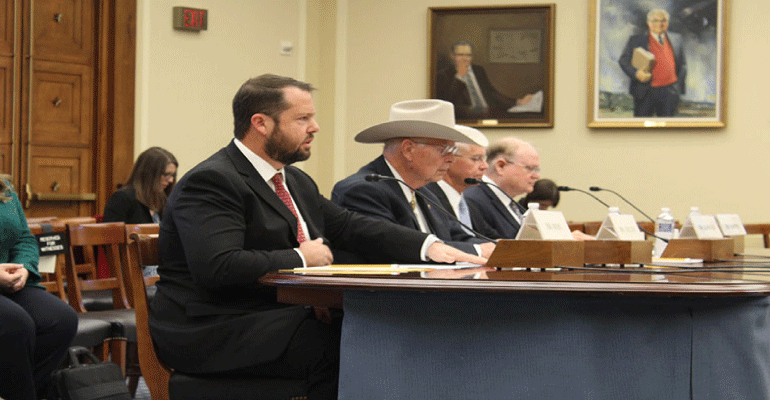
WASHINGTON – Federal regulation of waterways may not be the first issue that comes to mind in a desert state like Arizona, but don’t tell that to Pima County cattle rancher Jim Chilton.
Chilton was one of two Arizonans invited to testify Wednesday on the Waters of the United States rule, an Obama administration plan to streamline regulation of waterways. Critics charge that the plan, which never took effect, just muddied the waters and Chilton called it a “form of tyranny.”
“In my view, the 2015 WOTUS rule empowered bureaucrats to impose their personal views without concern for being called to account for their actions,” Chilton said in his prepared testimony. “We need a reasonable interpretation shared by citizens on what constitutes a navigable river and what is a genuine nexus to a navigable river.”
But others at the hearing by a House Space, Science and Technology subcommittee said complaints about the rule – which was blocked in court and then reversed by President Donald Trump – are overstated and that it is needed now more than ever.
“I have never heard that the water in our rivers, lakes, streams and ponds is too clean, that there are too many healthy fish to catch and eat, that our drinking water is too clean and abundant, or that we need more beach closures due to pollution,” said Ken Kopocis, a former water official at the Environmental Protection Agency.
The rule aimed to settle questions of jurisdiction between the EPA and U.S. Army Corp of Engineers, which has oversight of “navigable waterways.” But critics said the rule did little to clarify jurisdiction and may have opened the door to greater oversight by federal officials than the law intended.
Wesley Mehl, the deputy commissioner of the Arizona State Land Department, said the rules presented a particular challenge for arid, Western states.
“For state trust lands in Arizona, the most common category of ‘waters’ encountered are dry washes or arroyos,” Mehl said in his testimony. “These features are drainage areas with ‘ephemeral’ flow, i.e., they flow only in direct response to rainfall and are otherwise dry.”
Proving that they were not subject to federal regulation is costly for state landowners, Mehl said.
Rep. Andy Biggs, R-Gilbert, the subcommittee chairman, opened the hearing by calling the WOTUS rule “one of the biggest federal overreaches in modern history.”
The rule was blocked by a federal court just days after it took effect in 2015, and President Donald Trump signed an executive order in February that directed federal agencies to review the rule, with an eye toward rescinding or revising it.
Chilton, testifying on behalf of the National Cattlemen’s Beef Association and the Public Lands Council, said the 2015 rule “unlawfully burdened my ranching operation since I could not determine whether I would be in compliance or out of compliance on any necessary ranch improvement.”
Both Chilton and Mehl said better definitions and an objective analysis of what makes up waters of the United States are needed. Both cited language in a 2006 Supreme Court case that called those waters any “relatively permanent, standing or continuously flowing” waters that are connected to “navigable waters,” as well as connected wetlands.
Chilton said that definition should be “what the public and an agricultural producer can see is really a navigable waterway.”
But Kopocis said relying on that definition “has many adverse practical effects for protecting State waters from pollution and destruction.
“For example, eliminating the protection for intermittent and ephemeral streams will remove Clean Water Act protection for a significant number of waters – as much as 60 percent nationally,” he said. “In more arid areas of the country, this could be as high as 80 to 90 percent.”
Democrats on the subcommittee said the issue is “deserving of a thoughtful discussion” but that the panel was stacked against the rule.
“At a hearing ostensibly to examine the roles of states in the next phase of defining waters of the US, only one state has been brought to testify, the subcommittee’s chairman’s home state of Arizona,” said Rep. Eddie Bernice Johnson, D-Texas, in a prepared statement. “And there is also no one at the table from the EPA to provide an understanding of where things stand at the federal level.”
The EPA did not immediately respond to calls for comment Wednesday.
Kopocis said the problem is not going away.
“The Clean Water Rule advances the cause of protecting human health and the environment,” he said. “This is not a time for retreat.”
